Christopher Brookmyre
Christopher Brookmyre in Conversation
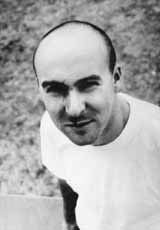 How much of Carl Hiaasen did you read before you started writing?
How much of Carl Hiaasen did you read before you started writing?
Well, I think it’s fairly well documented that I wrote three novels that weren’t published before I wrote Quite Ugly One Morning and then I read just about everything by Carl Hiaasen in the space of about six months, shortly before writing Quite Ugly One Morning. It was very much my style of humour, but I think the thing that inspired me was that he was doing something that I had never seen in British thrillers: making them outrageously funny and very over the top and yet still dealing with issues that were heartfelt on the part of the author. At the time my wife was coming home to me every night and ranting about what was going on in the NHS and so these two ideas came together.
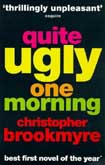 The other thing that I found quite inspiring with regard to a lot of American writers is they weren’t afraid to create heroes that you actually liked, that you enjoyed spending time with. You could give a few one liners to them and even make them a little more resourceful than is entirely plausible. I’d rather have such a guy as my hero than another maudlin alcoholic; a character who is so beset with marriage problems and such that he’s not much fun to be around – by the end he’s solved the mystery in spite of having a really miserable time.
The other thing that I found quite inspiring with regard to a lot of American writers is they weren’t afraid to create heroes that you actually liked, that you enjoyed spending time with. You could give a few one liners to them and even make them a little more resourceful than is entirely plausible. I’d rather have such a guy as my hero than another maudlin alcoholic; a character who is so beset with marriage problems and such that he’s not much fun to be around – by the end he’s solved the mystery in spite of having a really miserable time.
My way of repaying my debt to Hiaasen is the character of Darren in Quite Ugly One Morning: a tribute to all of the goons in her books who are seemingly big and dangerous, yet ultimately rather useless, ending up further debilitated page by page.
If anyone hasn’t read Hiaasen, do so immediately.
What happened to the three novels that you wrote before Quite Ugly One Morning?
They were rubbish: that’s why they didn’t get published. [laughs] It is quite an undertaking to get all the way through writing your first novel. It’s often said that everybody has a book in them; that’s true, but sometimes it’s not a very good one and it can be very difficult to find a second in you, especially if you’ve been discouraged by the response to the first. I think I was just stubborn and realistic in knowing that the first was rubbish and that while the second was rubbish, it was less rubbish than the first, and thus I was improving. The third was fairly passable, but it wasn’t really my idiom: I was trying to write what I thought publishers wanted instead of writing in my natural style. Reading books like Hiaasen’s encouraged me to think that I could write something in the style that came more naturally – not that it would necessarily get published, but at that time I didn’t care. It’s just for your own amusement when you’ve had three novels rejected.
Does your work go through various drafts, or does it require little revision? Has that changed as time has gone by?
I’ve found that the changes made by my editor with the last few books have been fewer and fewer, simply because the more that I write, the more I am able to anticipate the changes that my editor would have recommended anyway. I notice the parts that I may have neglected in the past, I can hear my editor’s voice saying, ‘We want more of this and less of that’. Only one of my books had a large amount of revision: Not the End of the World had about 20000 words cut and probably just about that much inserted from the first draft to the final one. It was a fairly complex story to begin with, but it had an entire parallel story which was deemed a little complicated, as we already had a gangling Motherwell supporter wandering around Los Angeles – confused enough, without throwing massive volcanic cataclysms into the equation. It’s a difficult process to realise that all this work that you’ve put in just doesn’t fit, though I do think the book became better having got rid of it. I just wish there was a DVD style director’s cut that you could bring out with deleted scenes and such.
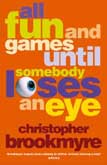 Also, my first draft of All Fun and Games Until Somebody Loses an Eye was 150,000 words: a lot more than I anticipated it would be. I had to cut about 10,000 words from that just to speed it up and make the narrative advance quicker. Again, there could be a call for deleted scenes there: people who read the first draft said that [though] these parts didn’t relate to the story they were among their favourite parts in the book. They were really puerile, actually, involving a woman on the cusp of middle age trying to fight off its acceptance and her husband’s infidelity by having a series of casual sexual encounters with waiters in restaurants. The only thing I regret about cutting it is losing all these fantastic wank gags throughout the rest of the book that referred to it!
Also, my first draft of All Fun and Games Until Somebody Loses an Eye was 150,000 words: a lot more than I anticipated it would be. I had to cut about 10,000 words from that just to speed it up and make the narrative advance quicker. Again, there could be a call for deleted scenes there: people who read the first draft said that [though] these parts didn’t relate to the story they were among their favourite parts in the book. They were really puerile, actually, involving a woman on the cusp of middle age trying to fight off its acceptance and her husband’s infidelity by having a series of casual sexual encounters with waiters in restaurants. The only thing I regret about cutting it is losing all these fantastic wank gags throughout the rest of the book that referred to it!
Do you ever see any of your books making movies?
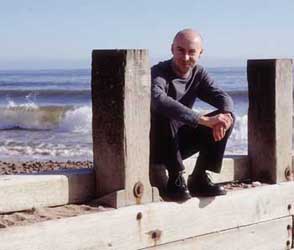 I sincerely hope some of them are movies! Someone is developing The Sacred Art of Stealing, but there hasn’t been any news on it in a wee while… One Fine Day in the Middle of the Night is still in development … I’ve been asked to write a horror film, which is what I’ll be doing this summer when I’ve finished my new book.
I sincerely hope some of them are movies! Someone is developing The Sacred Art of Stealing, but there hasn’t been any news on it in a wee while… One Fine Day in the Middle of the Night is still in development … I’ve been asked to write a horror film, which is what I’ll be doing this summer when I’ve finished my new book.
How did you feel about Quite Ugly One Morning, particularly James Nesbit’s Parlabane?
I thought that if it hadn’t been Nesbit playing Parlabane that it wouldn’t have been an ITV production. It’s what they call cast-led. Only when the actor expressed interest in the part did ITV say they would make it. I would have clearly preferred it to be a Scottish actor; he intended to play it in a Scottish accent up until days before filming started, but the producers and script editors felt that while his accent was quite good, people watching an actor who normally speaks with another accent end up watching him act rather than watching their character. … I thought it worked well as a one-off TV drama – it was very funny, and a million miles away from what you’d normally get on Sunday night on ITV. The most accurate comment came from a critic who liked it but called it a ‘latter-day Ealing comedy.’ … I was much happier watching the 7:84 adaptation of Boiling a Frog recently, because it’s very faithful to the book. Almost all the dialogue is mine, which was a stark comparison to Quite Ugly One Morning where only about three lines were – lines I wrote having added to the script, not lines from the book
If you could pick a Scottish actor to play Parlabane, who would you pick?
I would probably still pick Douglas Henshaw for the part. He just looked right, closest to my idea of Parlabane. And that was even before I found out he was from Barrhead like me and another lifelong St Mirren supporter.
You have a very strong female character in The Sacred Art of Stealing, and another in the new book. Do you think you’re moving more in that direction?
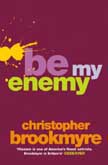 I’ve never sat down and thought that I wanted more or less male or female characters in a book. It’s generally what seems appropriate to the book. I was kind of aware that Be My Enemy was a very boys’ book, in that it’s very violent and it’s about male instincts of simplistic violent solutions – that’s what the book is railing against. All Fun and Games is probably the most ‘boys, toys, and gadgets’ scenario I’ve come up with, because it’s very much about my love of James Bond. … This story has underground bases and cars and weapons and espionage, but I wanted it as much as possible from a female point of view. Most of the narrative is from the perspective of a 46-year-old woman and a 20-year-old female computer hacker, neither of whom is going to be impressed with much machismo.
I’ve never sat down and thought that I wanted more or less male or female characters in a book. It’s generally what seems appropriate to the book. I was kind of aware that Be My Enemy was a very boys’ book, in that it’s very violent and it’s about male instincts of simplistic violent solutions – that’s what the book is railing against. All Fun and Games is probably the most ‘boys, toys, and gadgets’ scenario I’ve come up with, because it’s very much about my love of James Bond. … This story has underground bases and cars and weapons and espionage, but I wanted it as much as possible from a female point of view. Most of the narrative is from the perspective of a 46-year-old woman and a 20-year-old female computer hacker, neither of whom is going to be impressed with much machismo.
One of the other things that fed into the idea for the book was an interview I read with Stella Rimmington [former MI5 chief], who said that women – especially mothers – were best equipped for espionage because of their abilities to compartmentalise their minds and act out parts. For instance: to pretend to be angry with your child even though what they’ve done has you killing yourself with laughter inside. So All Fun and Games seems very much a boys’ book, but I like to think I’ve written it as a women’s book.
Do you ever watch morning television and makeovers?
I’ve never been asked that, but, no. Jennie is alluding to the fact that there’s a makeover scene in the book. A woman who has a very dowdy, frumpy view of herself has to look quite sophisticated. And there’s a kind of argument in the book about rebelling against the constant fetishising of youth, especially in women. Instead of saying, ‘You look good for 50′ we should be saying ‘You look good at 50.’My character doesn’t get made to look young, she gets made to look good. But it’s kind of a wish-fulfilment story, too, she gets to do these exciting things and be the sexy secret agent even though she’s a grandmother. I suppose I was trying to subvert the more conventional ideas about espionage and about sexual roles within this particular field of fiction. But that makes it sound serious, which it’s not.
Do you have a favourite work of fiction?
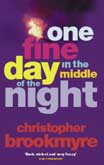 Out of the books I’ve written? I don’t know. If I was ever asked to pick one to recommend to anyone who hadn’t read my work before, I would start with One Fine Day. But I’m very happy with The Sacred Art of Stealing as well, and I think there’s ways in which All Fun and Games is more accomplished than anything I’ve written before. So I don’t know. It changes all the time. And I’m very excited about the one I’m working on, more so than I have been in years – so you’ll have to come back and ask me in a few years.
Out of the books I’ve written? I don’t know. If I was ever asked to pick one to recommend to anyone who hadn’t read my work before, I would start with One Fine Day. But I’m very happy with The Sacred Art of Stealing as well, and I think there’s ways in which All Fun and Games is more accomplished than anything I’ve written before. So I don’t know. It changes all the time. And I’m very excited about the one I’m working on, more so than I have been in years – so you’ll have to come back and ask me in a few years.
How do you research your books?
Generally I don’t research them. I only did a lot a research on It’s Not the End of the World, and that’s what led to 20,000 wasted words about ancient Minoan civilisation. You get sucked in, I’d call it research-it is: ‘I’ve read all this shite, so should you.’ On the whole I think it’s best not to wing it but to write what you know – and if you don’t know, find out what you need to. I’ve found that a great percentage of writing is about bluffing convincingly, making it sound like you know what you’re talking about. Half the time, especially when it comes to weaponry and so forth, I’d rather be making it up. I don’t want to become Clancy. I’d like to take the piss out of that approach by making up the specs of weapons and vehicles.
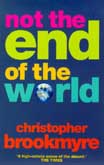 I remember coming up with a specification for a nuclear warhead in End of the World, one that had a remote timer … I thought, okay, make it sound like there is one. Add an acronym like ICBM or MIRV. I chose CHIB, and one of my editors asked me how I’d found out about all this stuff and what did the acronym mean? I said, no, it’s CHIB. Where I come from, that means any blunt instrument that you use to hit somebody. A nuclear warhead is the ultimate CHIB.
I remember coming up with a specification for a nuclear warhead in End of the World, one that had a remote timer … I thought, okay, make it sound like there is one. Add an acronym like ICBM or MIRV. I chose CHIB, and one of my editors asked me how I’d found out about all this stuff and what did the acronym mean? I said, no, it’s CHIB. Where I come from, that means any blunt instrument that you use to hit somebody. A nuclear warhead is the ultimate CHIB.
Christopher Brookmyre’s new book is Be My Enemy, available from Abacus at £6.99 PBK, ISBN 0349116814.
North Edinburgh Arts Centre has been open since November 2002 and hosts in its 96 – 150 seat studio theatre a diverse programme of small scale UK and International touring theatre, dance, film and live music. The arts centre also programmes a range of multi arts activities in its studio spaces, gallery, recording studio/live rooms, café bar and garden. 15a Pennywell Court, Edinburgh, EH4 4TZ. tel 0131 315 2151. www.northedinburgharts.com
© Jennie Renton 2005
Download the original audio recording of this Q&A session to hear the author’s opinions expressed in his own voice.

Comments